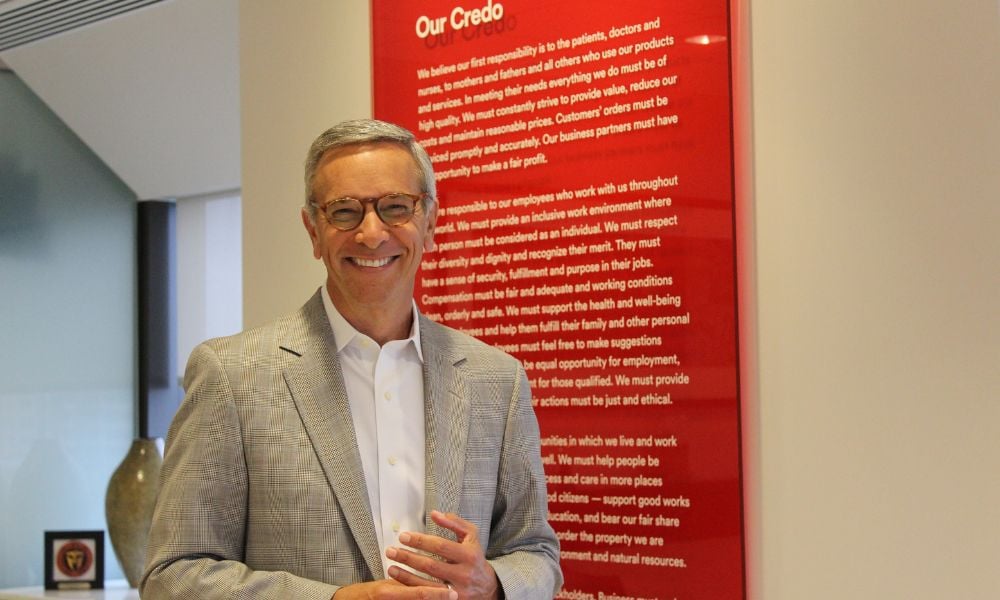
Responsible for over 155,000 employees, Peter Fasolo prioritizes EX and personalized learning

Peter Fasolo’s career has been guided by early childhood memories of his father and his dedication to helping others.
Now, as the Executive Vice President and Chief Human Resources Officer at pharmaceutical giant Johnson & Johnson, Fasolo is responsible for the wellbeing of over 155,000 employes – something that again harks back to his own upbringing.
“My father used to say to me ‘find your passion, and everything else will follow’,” he tells HRD. “When I got to college and took Introduction to Psychology, I fell in love, and life was launched. I switched my major from accounting to psychology and threw myself into the subject matter, wanting to understand why things happen the way they do and what motivates people and went on to pursue a master’s degree and Ph.D.
“It was during my graduate studies that I came to the determination I wanted to apply the craft of psychology and organizational behavior to a business setting, so that I could see the impact of what I was learning on individuals, teams and large-scale systems.”
Once he completed school, Fasolo began working in consulting with small- and medium-sized businesses and partnering closely with CEOs and top teams to apply the principles of psychology to the world of work, which eventually led him into the HR function.
“But along my journey, I continue to see my father’s advice in action – my career has never felt like it was work, but that I was simply following my passion for learning, understanding and helping solve challenges,” he says.
At Johnson & Johnson, Fasolo says that people are their greatest strength and asset.
“And our diverse, innovative and engaged workforce, which brings together different perspectives and life learnings, is a big reason why we are such a great place to work,” he tells HRD. “I believe our colleagues feel a strong connection to Our Credo and our mission as an organization – as I do myself. And they’ve joined us because their personal mission fits our mission to make a true impact to improve health worldwide.”
As Fasolo tells HRD, specific to HR at Johnson & Johnson, what makes them unique is that they’re actually supporting lives, not just careers.
“Our job is to support each other as whole people,” he explains. “This comes to life in various ways – our inclusive culture, our comprehensive employee benefit offerings, our personalized learning and development opportunities, and much, much more. We are extremely passionate about supporting the future of our company and ensuring all employees feel supported and capable of doing their best work. It’s a responsibility we don’t take lightly.”
The recent advancements in generative AI have revolutionized the way HR departments and their teams run.
According to data from Gartner, 48% of HR leaders are currently in the midst of drafting a rulebook on ChatGPT. In that research, HR leaders cited certain concerns of employees using generative AI, such as;
But that’s not stopping employers looking into the new tech. In the complex pharmaceutical industry, employers are more keen than ever to leverage technology to offer a best-in-class employee experience whilst also finding real-time solutions to modern day health care concerns.
“From our pharmaceutical R&D arm to MedTech, across the board, our priority is to build an ecosystem of digital innovators who are leveraging technology like AI to power effective healthcare solutions,” says Fasolo. “Specific to HR, we are prioritizing digital and analytic upskilling and have made it a priority for our HR function to equip our teams with the future-facing capabilities needed to meet rapidly evolving industry, business and employee needs.”
As for the future, Fasolo tells HRD that they intend to continue along the path of growth – even in a ‘tumultuous’ atmosphere.
“We’ll continue to see an emphasis put on the relationship between CHROs, CEOs and boards, particularly as our world becomes increasingly more complex, and alignment in building a best-in-class employee experience is paramount to delivering leading business results,” says Fasolo.
“In that same vein, as we navigate a tumultuous environment, we will start to see organizations become more innovative, competitive and agile in their talent strategy. Bringing forth new ways of building a diverse talent pipeline will be imperative – from attracting new talent to upskilling and reskilling efforts.
“Finally, flexibility will remain at the forefront for employees as today’s workforce demands environments that support autonomy, flexibility and purpose more than ever before.”